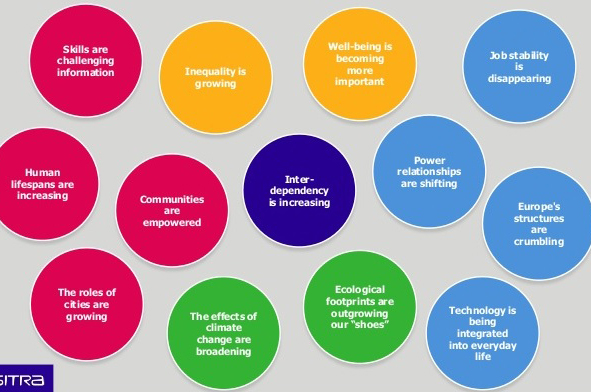This series of articles – Sitra Trends – reviews the trends listed by Sitra during October 2014, from a variety of perspectives. This article is the first in the series.
If you cannot list all of the European capitals from memory, does this reveal a gap in your general knowledge, or is the concept of general knowledge changing?
As a result of digitisation and the democratisation of information, knowledge is becoming increasingly open to all. However, the huge amount of new information being continuously created threatens to outstrip our capacity to process it. Our numerous email accounts, social media channels and news feeds are constantly bombarding us with far more new information than we can possibly assimilate. In addition to information created by humans, data is also being generated by the growing number of devices and sensors connected to the internet.
What is more, much of this information is now free. Socio-technological development has brought us to the point where rapidly outdated information as such is of little intrinsic value. Consequently, the prioritisation, processing and application of data have become increasingly valuable. The hottest profession of the future may well be that of the statistician.
What will constitute general knowledge in the future?
I was asked a memorable question at an event attended by principals of upper secondary schools in the Helsinki region. What will general education and knowledge be like in the future? If I was then asked to name all of the European states and their capitals, and I can honestly say that I could not do so from memory, even though I studied them in geography lessons in upper secondary school. Is this a gap in my general knowledge, or is the entire concept of general knowledge changing?
Nowadays, the answer to the “European states and their capitals” challenge is easy enough to find using Google. The use of search engines has become a basic modern skill. Even this, however, is a skill that can be developed. Although Google’s search engine uses algorithms to find the most appropriate search results purely on the basis of keywords, you can also learn to influence its search mechanisms. If I were interested in finding out about Sitra’s stakeholders, for example (or at least those whose network activity is related to Sitra), I could do a Google search for “related: www.sitra.fi”.
What skills will be needed in the future?
Other skills, besides the use of Google, will be important in the future. In any case, comprehensive ICT skills will be essential in work as well as in everyday life. While it is unlikely that we will all become coders, the basics of coding and logic will undoubtedly form useful general skills.
Globally, 13 billion US dollars was invested last year in ICT technology in schools. Technological development is changing education at a dizzying pace: location will become irrelevant, learning environments will become more versatile and interactive, and learning will become increasingly customised. Gamification is a growing trend in teaching.
Learning as such will be a key skill in the future. Continuous learning is one way of responding to the constant state of change in our world and the challenges this is creating. This includes the ability to unlearn old knowledge. Lifelong learning will require courage, enthusiasm, confidence and openness towards new things. In a complex and ever-changing world, the skill to adapt to a changing environment will be critical. Darwin’s famous quote, on the survival of species that adapt to their environment, is an apt reminder of the importance of adaptation skills. Cultural skills and the ability to communicate and get along with different types of people will be valuable in an increasingly global world.
We do not, however, simply have to adapt to change. Increasingly, we will also be able, or forced, to take the lead ourselves and in our action. This will heighten the importance of understanding the big picture, risk assessment, drawing conclusions, anticipating the future, entrepreneurship and co-operation skills.
Solving the challenging problems of the future will not be possible by specialising in a particular field, but by being able to combine different skills and knowledge, both one’s own and those of others.
Sitra’s next Synergise Finland forum will begin in December, on the theme New Education. The forum will bring together 30 people from all walks of society, to consider the future of education and learning. Those who are interested should follow the discussion generated around the forum.
Further information on this topic:
The IFLA Trend Report on the changing information society
The Atlantic: The Not-So-Distant Future When We Can All Upgrade Our Brains
Institute For The Future: From Educational Institutions to Learning Flows
Institute For The Future: Future Work Skills 2020
PR Newswire: Education Technology Spend Reaches $13 Billion
YLE: Finnish company to build the world’s biggest virtual school (in Finnish)
ZDNet: How Will the Internet of Everything Change Education by 2018


Recommended